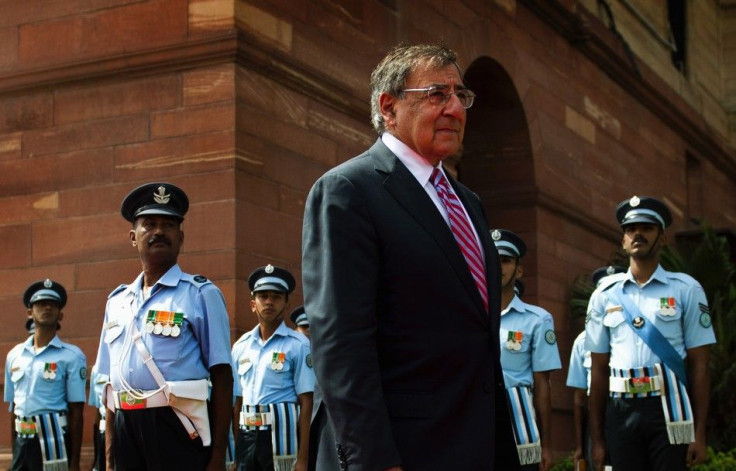Panetta Urges Deeper Military Ties Between U.S. And India, As Pakistan And China Watch Warily

On his first official visit to India as U.S. Defense Secretary, Leon Panetta has discussed a number of important issues, including security in Afghanistan and the Indian Ocean, as well as New Delhi’s tense relationship with Pakistan, ahead of the third India-U.S. Strategic Dialogue that will be held in Washington next week.
Panetta assured his Indian counterpart, A.K. Antony, that the U.S. wants to deepen military ties with India, but also urged the Indians to take a greater role in Afghanistan's security before and after the departure of NATO troops in that country.
We need to deepen our defense and security co-operation, and this is why I have come to India, Panetta said during a policy speech at the Institute for Defence Studies and Analyses in Delhi.
We are developing a new defense strategy for the 21st century. A central feature of this strategy is re-balancing toward the Asia-Pacific region. In particular, we will expand our military partnerships and our presence in the arc extending Western Pacific and East Asia into the Indian Ocean region and South Asia. Defense cooperation with India is the lynchpin of this strategy.
Of special significance, Panetta declared that the U.S. will permit India to purchase superior weaponry from Washington and also have the two allies jointly develop arms and equipment.
The United States is firmly committed to providing the best defense technology possible to India,” Panetta said in New Delhi.
“We are both leaders in technology development, and we can do incredible work together.”
The U.S. and India have already racked up $8 billion in defense-related trade, but Panetta heeded Antony’s advice that the two countries should share sophisticated technology more and move away from straightforward buy-and-sell arrangements.
We must move beyond a focus on individual arms sales to regular cooperation that increases the quantity and quality of our defense trade, the U.S. defense chief noted.
I think close partnership with America will be key to meeting India's own stated aims of a modern and effective defense force.
Panetta also recommended that India and the U.S. conduct more joint military exercises (ironically, Russian leader Vladimir Putin visiting China on the same day, vowed that Moscow and Beijing would also deepen their military connections).
India has been rapidly accelerating its purchase of military hardware to the tune of $100 billion in planned expenditures over the next decade. This development has alarmed both China and Pakistan, although Panetta downplayed these issues, citing that India and the U.S. want China to have a critical role to play advancing security and prosperity in this region.
Panetta even declared that his government welcomes the rise of a strong, prosperous and a successful China that plays a greater role in global affairs -- and respects and enforces the international norms that have governed this region for six decades.”
As for Pakistan, Panetta urged Indian officials to cooperate with Islamabad more and to continue with additional support to Afghanistan through trade and investment, reconstruction and help for Afghanistan's security forces.
However, Panetta defended the controversial use of military drone strikes that target militants hiding out along the border between Pakistan and Afghanistan, including the hit earlier in the week that reportedly killed al-Qaida’s No. 2 man, Abu Yahya al-Libi.
Pakistan has long complained that the unmanned strikes have killed too many innocent civilians and has demanded such operations be immediately stopped.
But Panetta said it is very clear that we [U.S.] are going to continue to defend ourselves. This is about our sovereignty as well, referring to al-Qaida’s September 2001 attacks in New York and Washington, D.C.
Panetta conceded that relations with Pakistan are difficult, but emphasized that both the U.S. and India should continue to engage Pakistan, overcoming our respective -- and often deep -- differences with Pakistan to make all of South Asia peaceful and prosperous.
He added: Pakistan is a complicated relationship, complicated for both of our countries, but it is one that we must continue to work to improve.
Interestingly, during his Indian sojourn, Panetta made no public mention of an agreement by New Delhi to purchase a fleet of C-17 transport planes and P-8 I maritime surveillance jets from Boeing; and a deal to purchase Lockheed Martin's Super Hercules transport aircraft.
India is also negotiating to purchase a fleet of Apache helicopters from Boeing and recently approved the purchase of 145 M-777 Howitzer artillery guns.
In 2011, India ruffled some feathers in Washington by dropping a plan to buy F-16 jets from Lockheed in favor of signing a $10 billion contract with Dassault Aviation of France, which offered more modern combat aircraft.
© Copyright IBTimes 2024. All rights reserved.




















